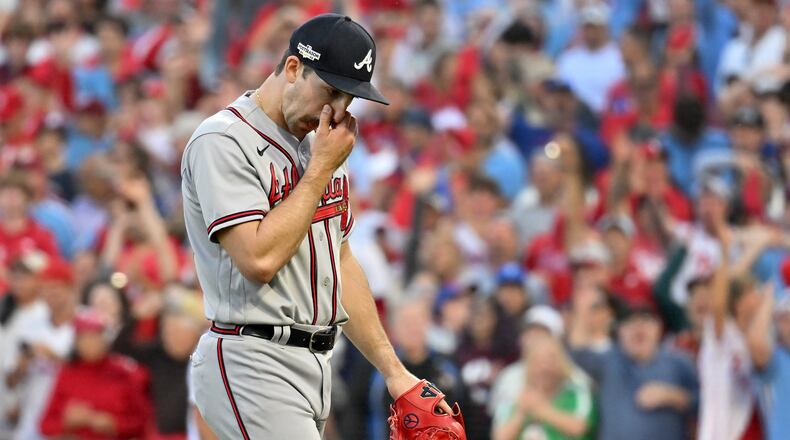PHILADELPHIA — Spencer Strider was an instant hit as a starting pitcher when the Braves desperately needed it this season. Michael Harris did the same thing for them in center field. Vaughn Grissom filled in admirably at second base after All-Star Ozzie Albies went on the injured list. Those rookies played big parts in the Braves’ surge from far behind the Mets in the National League East to a fifth consecutive division title.
They aren’t giving the Braves the same thing in October. The young guys are having a tough time in the Division Series against the Phillies, who lead two games to one in the best-of-five series after Friday’s 9-1 victory.
The Phillies roughed up Strider for five earned runs in 2-1/3 innings. He allowed as many runs only twice over 20 starts during the season. Grissom has three strikeouts in three at-bats during the NLDS. Harris had an RBI single in Game 3, but that’s his only hit in 11 at-bats during the series.
Strider, 23, is the youngest of the Braves’ starting pitchers. Harris and Grissom aren’t yet 22 years old. All three players are in the postseason for the first time. But it’s probably too simple to say the pressure is getting to them. Even veteran players can look bad at this time of year.
Braves All-Stars Austin Riley and Dansby Swanson are a combined 3-for-24 in the NLDS. Designated hitter Marcell Ozuna is 0-for-8. Eddie Rosario, a star during the Braves’ 2021 postseason run, is 0-for-5 in this one. Staff ace Max Fried gave up four earned runs over 3-1/3 innings in the Game 1 loss. It happens to the best players when the competition is strong and sample sizes small.
Still, the Braves aren’t going to make another deep postseason run without contributions from their rookies. The Braves are trying to become the youngest team to win the World Series in the divisional era, per Baseball Reference, with an average age of 25.5 years old (weighted by games played). The Braves are in danger of not making it out of the NLDS after Strider’s ineffective start sent them to a lopsided loss.
Strider hadn’t pitched in a game since Set. 18 because of a left oblique strain. Manager Brian Snitker decided to start him in Game 3 and save veteran right-hander Charlie Morton for Game 4. That’s now an elimination game for the Braves. They never had one during last year’s postseason.
Strider threw two bullpen sessions to ramp up for his first postseason start.
“He felt great,” Snitker said. “He passed all the tests. It just didn’t work today.”
Snitker said the Braves hoped to get four innings out of Strider. That plan looked promising when Strider was perfect through two innings with three strikeouts. Then Strider came unraveled in the third.
He started it with a four-pitch walk to Brandon Marsh. The next batter, Bryson Stott, was behind 1-2 in the count when Strider tried to pick off Marsh at first base. Strider might have got him with an accurate throw. First baseman Matt Olson couldn’t save Strider’s wayward throw, and Marsh went to third base on the error.
That play got Phillies fans in a frenzy. Strider’s next pitch to Stott, the No. 9 hitter, was a ball. Stott fouled off the next five pitches. Each one increased the anticipation for Phillies supporters. Stott rewarded them with an RBI double to right field.
That’s when Snitker finally got pitchers up in the bullpen.
“As good as he was throwing, we thought we could skate him through,” he said.
Braves pitching coach Rick Kranitz went out to talk to Strider with Kyle Schwarber up next. Snitker had Strider intentionally walk Schwarber to get to Rhys Hoskins. Schwarber bats lefty and Hoskins hits from the right side. Right-handed batters hit .185 vs. Strider this season with a 44.2% strikeout rate. Hoskins was 0-for-9 with six strikeouts against Strider this year.
Strider tried to throw a fastball by Hoskins on the first pitch. The pitch was over the middle of the plate at 93.8 mph, the lowest velocity for Strider’s fastball all season.
Strider said he wasn’t having any physical issues and wasn’t feeling nerves. How does he explain the decreased velocity?
“I have no idea,” he said. “I felt fine. ... Throw it 91 or 101, you throw it right down the middle, they usually hit it.”
Strider’s relatively slow fastball rocketed off Hoskin’s bat at 107.3 mph. The three-run homer put the Phillies ahead 4-0. Philadelphia fans got an emotional release that they hadn’t felt since they last saw a postseason game here, 11 years ago.
J.T. Realmuto hit Strider’s next pitch for a sharp single. Snitker called on another rookie, left-hander Dylan Lee, to try and limit the damage. Lee was one of the Braves’ best relief pitchers this season. His 2.13 ERA was 20th best among qualified MLB relievers. Snitker hasn’t been reluctant to use Lee in important situations, and Lee usually left things better than when he entered.
That didn’t happen in Game 3. Bryce Harper sent Lee’s first pitch into the seats in right field for a two-run homer. The six-run deficit was too much for the Braves, given how Phillies starter Aaron Nola was going. He held the Braves scoreless over six innings.
Lee, Harris and Grissom could get more chances to make an impact against the Phillies. Strider will have to wait until the NL Championship Series, should the Braves advance.
“It’s very frustrating, but now Charlie’s gonna go out and give us a chance tomorrow,” Strider said. “Obviously (we) need to have a good game and confident we will, and then hopefully (I’ll) get back out there and do better.”
That’s the right approach for the rookies who helped the Braves win the East but are struggling so far in October.
About the Author
The Latest
Featured

